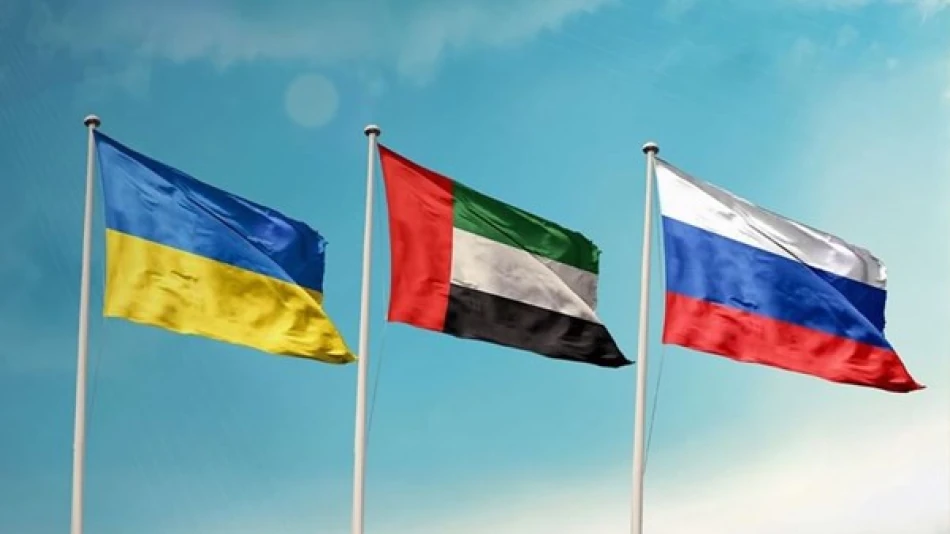
UAE Brokers Successful Prisoner Swap: 168 Captives Released in Russia-Ukraine Mediation
UAE Emerges as Key Mediator in Russia-Ukraine Conflict with 16th Successful Prisoner Exchange
The United Arab Emirates has successfully mediated its 16th prisoner exchange between Russia and Ukraine, facilitating the release of 168 captives and bringing the total number of prisoners exchanged through UAE mediation to 4,349. This latest diplomatic achievement underscores the Gulf nation's growing influence as a neutral intermediary in one of the world's most significant ongoing conflicts.
Latest Exchange Brings Total Mediations to 16
The most recent prisoner swap involved 84 individuals from each side, continuing a pattern of UAE-brokered humanitarian exchanges that began shortly after Russia's invasion of Ukraine in February 2022. The UAE Ministry of Foreign Affairs expressed gratitude to both nations for their cooperation, highlighting how this collaboration reflects recognition of the Emirates' commitment to resolving the crisis.
With this 16th successful mediation, the UAE has established itself as perhaps the most consistent third-party facilitator of prisoner exchanges in the conflict, surpassing efforts by other neutral countries and international organizations in terms of frequency and scale.
Strategic Positioning in Global Diplomacy
Balancing Act Between East and West
The UAE's mediating role reflects its carefully calibrated foreign policy that maintains strong relationships with both Russia and Western allies. Unlike many nations that have imposed comprehensive sanctions on Russia, the Emirates has positioned itself as a bridge between opposing sides, similar to Turkey's approach but with arguably greater success in humanitarian matters.
This diplomatic strategy mirrors the UAE's broader approach to international relations, where economic pragmatism often takes precedence over ideological alignment. The country has maintained trade relationships with Russia while simultaneously strengthening ties with NATO countries and supporting humanitarian aid to Ukraine.
Comparison with Other Mediators
While countries like Turkey, Saudi Arabia, and China have attempted various forms of mediation in the conflict, none have achieved the consistency of the UAE's prisoner exchange program. Turkey's early efforts focused more on grain deals and high-level diplomatic meetings, while China's involvement has been viewed with suspicion by Western allies due to its closer ties with Moscow.
Implications for Regional and Global Influence
Enhanced Diplomatic Capital
Each successful prisoner exchange enhances the UAE's reputation as a reliable mediator, potentially positioning the country for larger roles in future peace negotiations. This diplomatic capital could prove valuable in other regional conflicts and in the UAE's broader ambitions to become a global hub for international dialogue and conflict resolution.
The consistent success of these exchanges also demonstrates the UAE's ability to maintain operational channels with both sides even as the conflict has intensified and other diplomatic avenues have been severed.
Economic and Strategic Benefits
Beyond humanitarian considerations, the UAE's mediating role serves multiple strategic purposes. It reinforces the country's image as a stable, neutral actor in an increasingly polarized world, which supports its position as a global business and financial hub. International companies and investors often view such diplomatic stability as a positive factor when making long-term investment decisions.
Challenges and Future Prospects
While prisoner exchanges represent important humanitarian victories, they occur against the backdrop of an ongoing military conflict with no clear resolution in sight. The UAE's ability to facilitate these swaps demonstrates functional communication channels with both sides, but translating this success into broader peace negotiations remains a significant challenge.
The Ministry of Foreign Affairs' commitment to continue mediation efforts suggests the UAE sees long-term strategic value in maintaining this role, regardless of how long the conflict persists. This approach positions the Emirates as an indispensable humanitarian facilitator while building relationships that could prove crucial in eventual post-conflict reconstruction efforts.
As the conflict approaches its third year, the UAE's consistent mediation success stands as one of the few bright spots in an otherwise deteriorating diplomatic landscape, offering both immediate humanitarian relief and a potential foundation for future peace-building efforts.
Most Viewed News

 Layla Al Mansoori
Layla Al Mansoori






